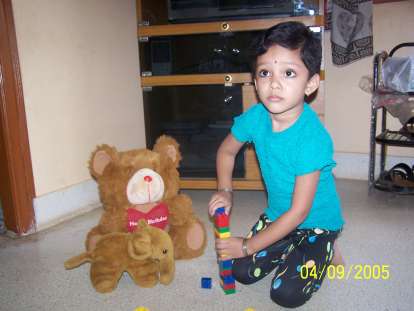Yes, make it a habit to narrate stories to your children everyday. The best time slot is one after dinner. Stories stimulate thought processes in your children. They enable children develop their listening ability. Besides they enable children turn communicative. Children listen to stories and appreciate the good actions of the characters there in. The stories format the values and imbibe discipline in children. You may not be able to see immediate returns but they will make a long term impact on the character of children.
 I always relished the bed time ritual of my grandpa who used to narrate beautiful stories every day sitting in the veranda of our house in his easy chair. These stories used to wrap up each day with a wonderful sense of well being. Sometimes he used to narrate his own life experiences and at other times stories from great epics Ramayana and Mahabharata or from treasury of stories that are the Bhagavata and the Panchatantra.
I always relished the bed time ritual of my grandpa who used to narrate beautiful stories every day sitting in the veranda of our house in his easy chair. These stories used to wrap up each day with a wonderful sense of well being. Sometimes he used to narrate his own life experiences and at other times stories from great epics Ramayana and Mahabharata or from treasury of stories that are the Bhagavata and the Panchatantra.The style of his narration, I still remember, used to be naive. He used to bring in new words and use them in right context. He used to speak for different characters and the lucid interesting conversation used to keep us live on our toes.
In summer, we used to sit in the yard after dinner. We had no electricity in those days and it used to be dark. We used to carry our chairs and arrange them in a semicircle. He never used to scare us, and we never dreaded darkness. At times, whenever there was an interval we used to throw our heads back and wonder at the innumerable number of stars in the sky.
My grandpa used to render a touch of philosophy too as the stories unfurled, most of which were reflections from his own life. I always used to wonder at his ability to tell great stories. Clad in a simple dhoti and jubba, he was as simple as the messages in his stories.
Providing enough story books is one thing, but bringing alive the stories in them via narration totally transports the children to another magical world where there imagination runs free and enhances their thinking abilities.





